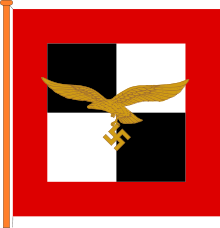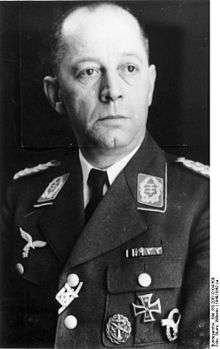Luftflotte 4
Luftflotte 4[1] (Air Fleet 4) was one of the primary divisions of the German Luftwaffe in World War II. It was formed on March 18, 1939, from Luftwaffenkommando Österreich in Vienna. The Luftflotte was redesignated on 21 April 1945, to Luftwaffenkommando 4, and became subordinated to Luftflotte 6. It was the Luftflotte 4, that was responsible for the bombing campaign of Stalingrad, where ca. 40,000 civilians died. This Luftwaffe detachment was based in Romania, Bulgaria, Southeast Poland, Hungary, Ukraine and Russian occupied territories, for supporting Axis forces; with command offices in Morczyn, Hungary, during 26 June 1944, Eastern Front.
See Organization of the Luftwaffe (1933–1945) for explanation of abbreviations used below.
Transports (special duties)
- 14 St./Transportgeschwader 4 (Odessa)
I. Fliegerkorps (I. Air Corps) Focşani
Tactical reconnaissance
Maritime reconnaissance
Fighters
Land air strike
Bombers (medium)
- I./KG.4 (Focşani)
VIII.Fliegerkorps (VIII Air Corps) Lubien Poland
Tactical reconnaissance
- Stab/NAGr.2(Strunybaby)
- 1./NAGr.2(Strunybaby)
- 2./NAGr.2(Strunybaby)
Land air strike
Night land attack
- Stab/NSGr.4 (Hordinia)
- 1./NSGr.4 (Hordinia)
Bombers
- 14.(Eis.)KG.27 (Krosno)
Fliegerfuhrer 102 Ungarn (102 Air Direction in Hungary)Labunia
Tactical reconnaissance
- (Ung)N.A.St.102/1 (Labunia)
- 7./NAGr.32 (Labunia)
Fighters
- (Ung)J.St.102/1 (Zamość)
Bombers
- (Ung)K.St.102/1 (Klemensova)
Rapid bombers
- (Ung)SK.St.102/1 (Klemensova)
Romanien I Fliegerkorps (I Romanian Air Corps) Tecuci
Strategic/tactical reconnaissance
- (Rum)2.(F) A.St. (Iveşti)
- (Rum)102 A.St. (Vilkov)
- (Rum)(C.A.1)1A.St.(Bacău)
Fighters
Tactical support (dive bombers)
- (Rum)StG.3 (Călimăneşti?) StG is Sturzkampfgeschwader, dive bombers
- (Rum)StG.4 (Huşi)
- (Rum)StG.8 (Matca)
- (Rum)(G.P.)StG.3(Detach)(Odessa)
- (Rum)(G.P.)StG.3 (Cioara-Dolceşti)
Bombers
Kom. Gen.d.dtsch. Lw.i. Rum (general in chief of German Air Force in Romania) Bucharest
Jagdabschnittsfuhrer Rum. (chief of sector fighters of Romania) Bucharest
Fighters
- I./JG.53 (Târgşorul-Nou)
- III./JG.77 (Mizil)
- (Rum)I./JG.2 (Roşiori)
- (Rum)43. J.St.(Roşiori)
- (Rum)63.J.St.(Roşiori)
- (Rum)64.J.St.(Roşiori)
- (Rum)VII JGr.(Popești-Leordeni)
- (Rum)59./VII JGr.(Popești-Leordeni)
- (Rum)61./VII JGr.(Popești-Leordeni)
- (Rum)62./VII JGr.(Popești-Leordeni)
- (Rum)VII.JGr. (Boteni)
- (Rum)53./VII.J.St (Boteni)
- (Rum)57./VII.J.St.(Boteni)
- (Rum)51.J.St. (Ţepeş Vodă)
- (Rum)52.J.St. (Mamaia)
- (Rum)58.J.St. (Pipera)
Night fighters
Commanding officers

Flag for the Chief of a Luftflotte
- Generaloberst Alexander Löhr, 18 March 1939 – 20 July 1942
- Generalfeldmarschall Wolfram Freiherr von Richthofen, 20 July 1942 – 4 September 1943
- Generaloberst Otto Deßloch, 4 September 1943 – 17 August 1944
- Generalleutnant Alexander Holle, 25 August 1944 – 27 September 1944
- Generaloberst Otto Deßloch, 28 September 1944 – 21 April 1945
Chief of staff

Herbert Olbricht
- Oberst Günther Korten, 18 March 1939 – 19 December 1939
- Oberst Herbert Olbrich, 19 December 1939 – 21 July 1940
- Obstlt Andreas Nielsen, 21 July 1940 – 3 November 1940
- Oberst Richard Schimpf, 4 November 1940 – 15 January 1941
- Generalleutnant Günther Korten, 15 January 1941 – 12 August 1942
- Oberst Hans-Detlef Herhudt von Rohden, 24 August 1942 – 23 February 1943
- Oberst Karl-Heinrich Schulz, 1 March 1943 – 25 March 1943
- General Otto Deßloch, 26 March 1943 – 3 September 1943
- Generalmajor Karl-Heinrich Schulz, 3 September 1943 – 21 April 1945
gollark: Oh, also fortnights.
gollark: No, bee lifespans.
gollark: Actually, all SI prefixes plus unofficial ones.
gollark: It also supports most SI prefixes.
gollark: See? BEE LIFESPANS.
References
- Notes
- For an explanation of the meaning of Luftwaffe unit designation see Luftwaffe Organisation
- References
This article is issued from Wikipedia. The text is licensed under Creative Commons - Attribution - Sharealike. Additional terms may apply for the media files.